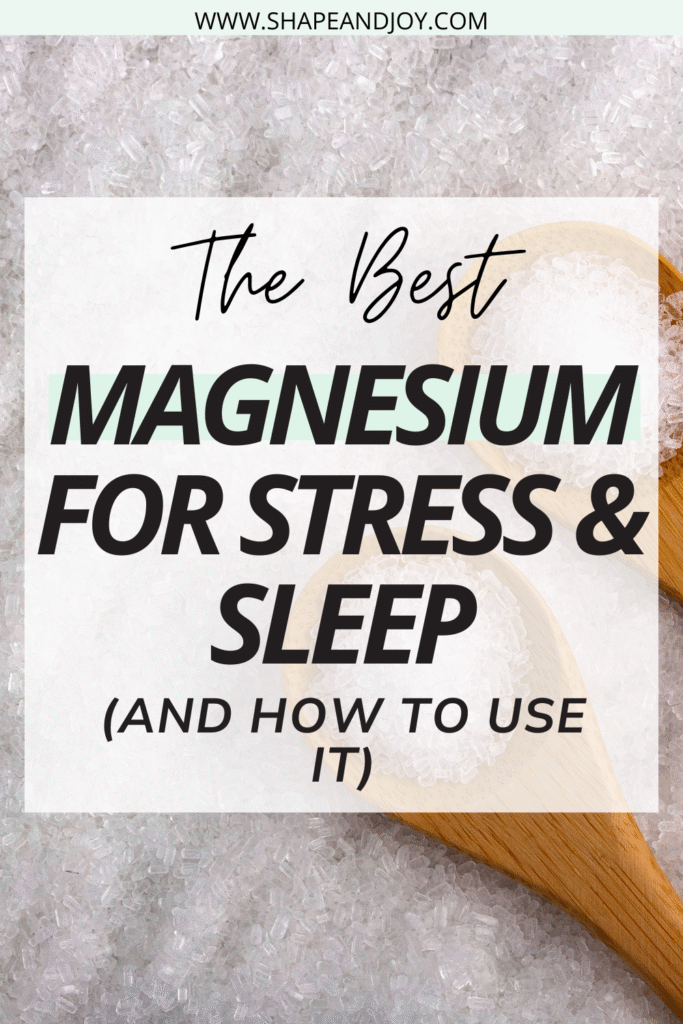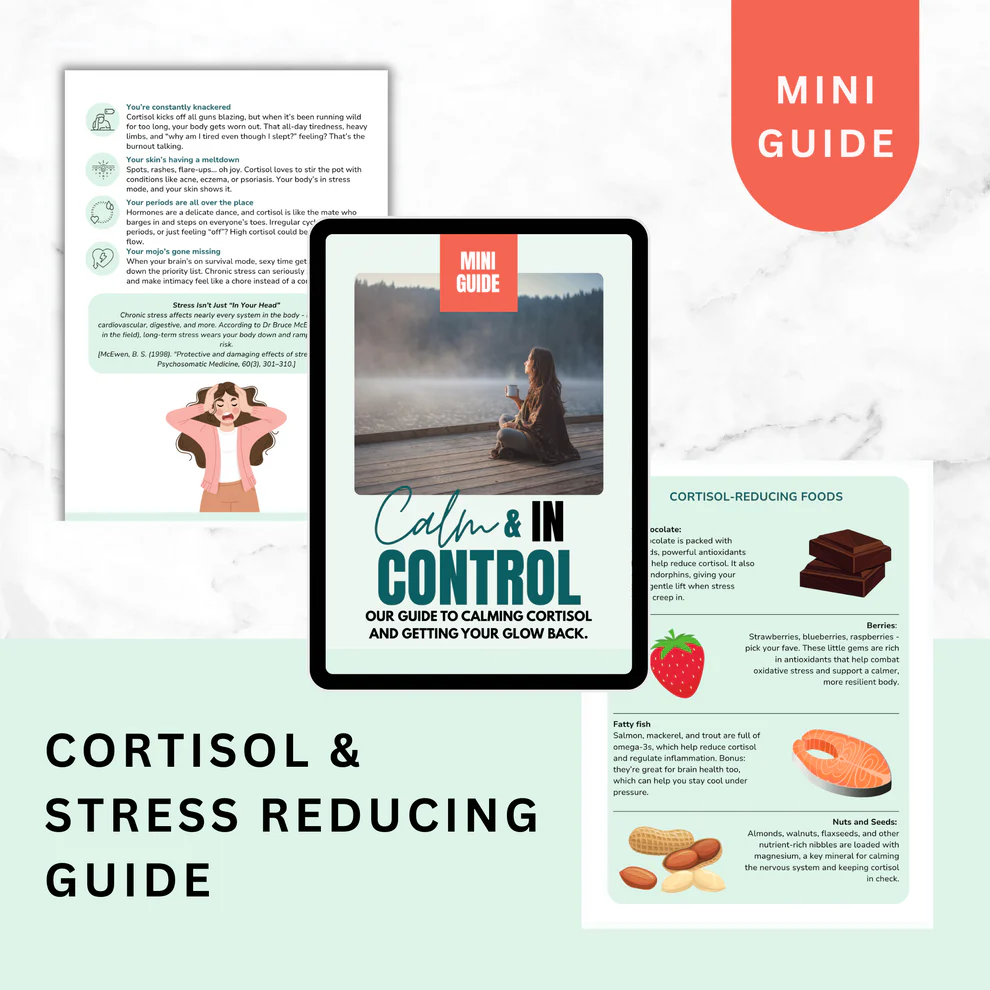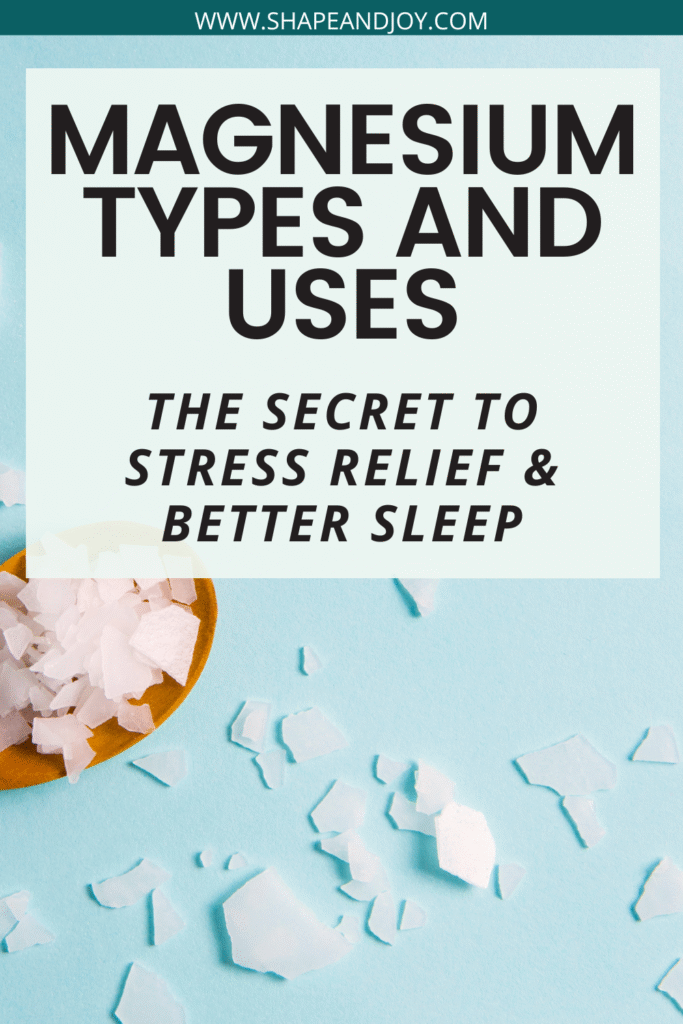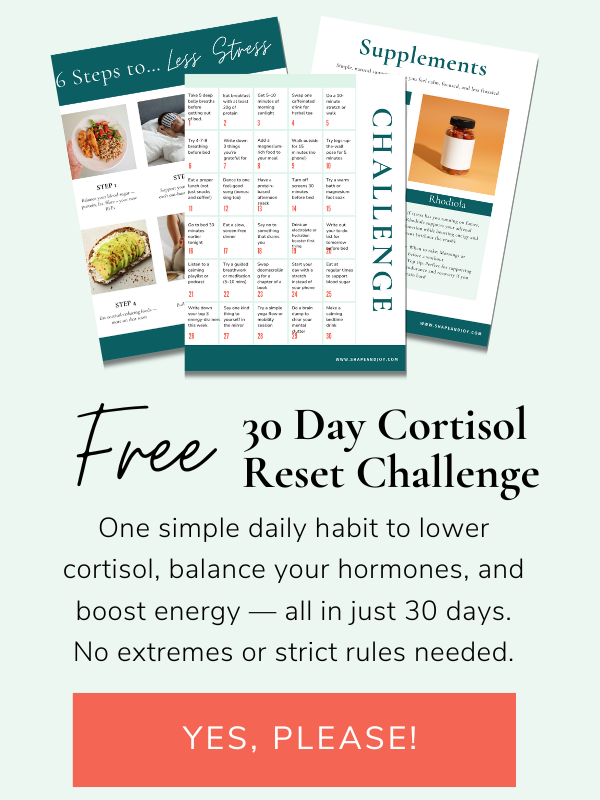This post may contain affiliate links, which means that I may earn a commission if you click on the link, with no cost for you. It’s one of the ways I support my blog. You can read more about this here.

Feeling stressed, wired at night, and exhausted in the morning? You might be dealing with low magnesium without even realising it.
Nearly 80% of adults don’t hit their recommended daily magnesium intake, and that shortfall can ramp up your cortisol levels, mess with sleep, and keep your nervous system stuck in “fight or flight.”
In this post, we’ll break down the different kinds of magnesium, explain what magnesium is used for, and uncover the best types of magnesium and uses for stress, sleep, and hormone balance.
We’ll also cover what is magnesium good for, how to choose the right supplement, and the best time to take magnesium for cortisol support.
So, if you’ve ever wondered which magnesium should I take? or how to boost magnesium intake, you’re in the right place. Let’s dig into the best magnesium options for reducing stress and balancing your cortisol levels naturally.
1. Why Magnesium Matters for Stress & Cortisol
Magnesium is more than just another vitamin on your shelf, it’s one of the best supplements for stress and hormone support.
When cortisol spikes, magnesium helps to bring it back down, calming your nervous system and improving sleep.
If you’ve been searching for high cortisol remedies, magnesium is a no-brainer. It’s one of the simplest cortisol supplements you can use to reduce cortisol naturally, prevent hormonal weight gain, and protect against burnout.
So if you’ve been asking how to reduce cortisol levels naturally, magnesium is one of the first things to add to your routine.
2. Signs You May Be Low in Magnesium
Here’s the kicker: most of us aren’t getting enough from diet alone. A magnesium deficiency can sneak up on you, and the symptoms often overlap with stress itself.
Look out for:
- Trouble falling asleep or staying asleep
- Muscle cramps or restless legs
- Feeling wired but tired
- Constant stress or irritability
- Headaches or brain fog
If these sound familiar, it’s time to check your magnesium sources and think about what magnesium to take. Luckily, there are different benefits depending on the type of magnesium you choose.

3. The Best Types of Magnesium for Stress & Sleep
Not all magnesium pills are created equal. Different magnesium supplements serve different purposes, so let’s cut through the confusion.
- Magnesium Glycinate: The superstar for stress and anxiety. Magnesium glycinate benefits include deeper sleep, calmer nerves, and easy absorption.
- Magnesium Citrate: Great for stress-related digestion issues. Helps with bloating and constipation while still supporting cortisol reduction.
- Magnesium Malate: Best for energy crashes and fatigue. Think of it as your “wake-up without the jitters” form.
- Magnesium L-Threonate: A newer option. Magnesium L-threonate benefits include supporting memory, focus, and brain health. Brilliant if high cortisol leaves you foggy.
- Magnesium Oxide: Cheap but poorly absorbed. Not ideal for stress or sleep.
If you’ve been wondering which magnesium is best for you, the answer depends on your main concern. For stress and sleep, glycinate wins. Brain health, threonate shines. For digestion, citrate delivers. These are the different magnesium benefits you need to know.
📌 Pin this for later! ⬇

4. How to Take Magnesium for Cortisol Support
Knowing what is the best time to take magnesium makes all the difference.
- For stress relief or sleep: take magnesium in the evening, about an hour before bed.
- For energy: take magnesium malate in the morning.
- For digestion: magnesium citrate works well with meals.
If you’re wondering how much magnesium should I take, most people benefit from 200-400mg per day, but always check the label and listen to your body.
Don’t forget natural magnesium sources like leafy greens, nuts, seeds, and dark chocolate. These foods fit beautifully into a cortisol diet or hormone-balancing diet.
Adding both food and supplements is the best way to boost magnesium intake while supporting your hormone levels.
5. The Perfect Stress-Relief Pairings
Magnesium is great solo, but even better stacked with other hormone balancing supplements.
Ashwagandha and Cortisol: The Adaptogen That Balances Hormones & Reduces Stress – Pairing magnesium with adaptogens like ashwagandha is one of the best natural remedies for high cortisol and stress resilience.
L-Theanine: The Calming Amino Acid That Helps Lower Cortisol & Anxiety – Magnesium relaxes your body, while L-Theanine calms your mind. Together, they’re the ultimate sleep + stress stack.
When combined with foods to lower cortisol levels, herbs for cortisol, and even somatic exercises to reduce cortisol, you’ve got yourself a powerful cortisol detox plan.
6. How Magnesium Fits Into a Complete Cortisol-Lowering Routine
Magnesium is one of the best supplements for regulating stress, but the bigger picture matters too.
To really know how to help cortisol levels, try:
- Prioritising good sleep routines.
- Following a hormone balancing diet with plenty of magnesium sources.
- Adding movement like yoga or walking as part of your daily high cortisol remedies.
- Using natural remedies for high cortisol like lavender or other hot flashes essential oils for relaxation.
For the full rundown of what to take to lower cortisol, dive into The Best Cortisol-Lowering Supplements: Your Complete Guide to Stress Relief.
Psst… Feeling Wired, Tired, or Just Not Right?
If you’re ticking off your goals but still feel foggy, frazzled, or like your body’s low-key working against you, it might not be your fault. High cortisol could be running the show behind the scenes.
Enter: Calm & In Control – your no-fluff guide to calming cortisol and getting your glow back.

This mini guide is for you if you’re constantly running on empty, waking up exhausted, or wondering why your mood, sleep, digestion (and sanity) are all over the place, even though you’re trying to do “all the right things.”
Inside, you’ll get real talk on stress hormones, the signs of imbalance, and simple strategies that actually work – no crash diets, toxic hustle, or woo-woo fluff.
It’s basically the stress-support starter pack I wish every woman had.
- Learn what your body’s really trying to tell you
- Fuel it in a way that feels safe and supportive
- Build chill-out routines that actually calm your system
- Spot the red flags before burnout hits full swing
No guilt. No perfection. Just clear, doable steps to help you feel calm, clear, and back in control again.
Because glowing up isn’t just about skincare and smoothies, it’s about feeling safe in your own body.
Read These Next
- Ashwagandha and Cortisol: The Adaptogen That Balances Hormones & Reduces Stress
- L-Theanine: The Calming Amino Acid That Helps Lower Cortisol & Anxiety
- The Best Cortisol-Lowering Supplements: Your Complete Guide to Stress Relief
Conclusion
From different magnesium types and uses to the best timing and pairings, magnesium is a simple but powerful way to support stress relief and sleep.
Choose the right form, use it consistently, and let this mineral help you balance cortisol levels like a pro.
Remember: your body isn’t broken, it just needs the right tools.
Next Steps
“Rest is not idle, it’s medicine.”
- Grab my freebie: The Cortisol 30-Day Cleanse Challenge printable – the perfect way to reset stress hormones and boost your daily magnesium intake.
- Read This Next: Ashwagandha and Cortisol: The Adaptogen That Balances Hormones & Reduces Stress
- Or check out the full Cortisol Lowering Series for more high cortisol remedies, natural supplements, and hormone-balancing diet tips.
📌 Pin this for later! ⬇




